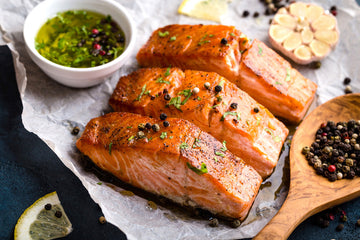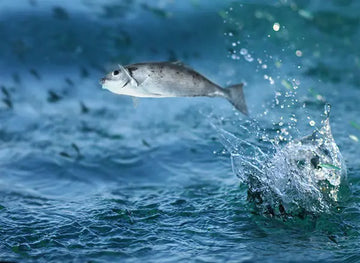The Cultural Significance of Fish in South India
In South India, fish is more than just food-it is deeply woven into traditions, celebrations, and livelihoods. It symbolizes prosperity, devotion, and heritage, appearing in temple rituals, wedding feasts, and daily meals. As fish consumption rises across India, its role extends beyond cultural identity to becoming a modern superfood.
Fish in South Indian Cuisine: A Feast of Flavors
With its long coastline and rich inland waters, South India has perfected the art of cooking fish. Each state brings its own distinct style to seafood preparation. In Kerala, dishes like Meen Moilee, a delicate coconut-milk curry, and Karimeen Pollichathu, where pearl spot fish is marinated, wrapped in banana leaves, and grilled, highlight the region’s love for mild yet flavorful seafood. Tamil Nadu’s cuisine leans towards bold flavors, with Meen Kuzhambu, a tamarind-based fish curry slow-cooked in clay pots, delivering a smoky depth. Andhra Pradesh is known for its fiery preparations, such as Chepala Pulusu, a spicy fish stew infused with red chilies and garlic. In Karnataka, Mangalorean Fish Curry stands out for its rich coconut base, reflecting the region’s preference for balanced yet intense flavors.
For South Indians, fish is not just a dish; it is a daily ritual. Served with rice, it is a staple food, often cooked using time-honored recipes passed down through generations.
Fish in South Indian Traditions and Festivals
Fish holds deep cultural significance across South India. In coastal communities, offering a fresh catch at temples before a wedding is a common practice to seek blessings for a prosperous married life. Wedding feasts, especially in Christian and Muslim households, often feature an elaborate spread of seafood.
Fishing communities have their own rituals, with many offering the first catch of the day to the sea or a deity as an expression of gratitude. These traditions not only reflect the deep spiritual connection South Indians have with fish but also highlight its role in shaping social and cultural customs.
Fishing: The Backbone of South India’s Economy
Fishing is not just a tradition in South India; it is the livelihood of millions. The region’s 2,500 km coastline sustains vast fishing communities, with local seafood markets thriving on the daily catch. India is one of the world’s largest fish producers, with aquaculture playing a crucial role in meeting growing demand.
Despite its economic importance, fishermen face several challenges, including unpredictable weather, overfishing, and financial instability. Sustainable fishing policies, better infrastructure, and government support are essential to protecting both their livelihoods and the marine ecosystem.
The Health Benefits of Fish
Fish is a powerhouse of nutrition, rich in Omega-3 fatty acids, proteins, and essential vitamins. Traditional South Indian recipes enhance its health benefits through the use of turmeric, coconut, tamarind, and curry leaves-ingredients known for their medicinal properties. Doctors recommend consuming fish at least twice a week for heart health, brain function, and immunity. With increasing awareness of its benefits, fish is no longer just a cultural staple but also a modern superfood embraced for its nutritional value.
Conclusion: A Tradition That Lives On
In South India, fish is more than just food-it is a cultural legacy, a livelihood, and a symbol of tradition. From temple offerings to wedding feasts, from home kitchens to bustling seafood markets, fish continues to connect generations and sustain millions. As food habits evolve and lifestyles change, the deep rooted love for fish remains a constant, carrying forward centuries of history, tradition, and devotion in every bite.





